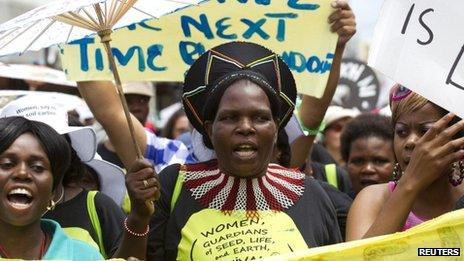Protests at climate change summit in Durban
- Published

Protesters rallied in Durban on Saturday
Thousands of demonstrators have marched through the South African city of Durban demanding faster action on climate change.
The annual UN climate summit is being held at the city's convention centre.
Protesters were particularly angered by the stance of rich countries such as the US and Canada.
In London former UK Deputy Prime Minister Lord Prescott said the approach of these nations was "appalling".
Halfway through this summit, some progress has been made, but a few countries including the US, Canada and Saudi Arabia are holding out on important issues such as the future of the Kyoto Protocol.
Fourteen years ago, Lord Prescott played a leading role in the UN summit in Kyoto that brought the protocol into existence.
Speaking to the BBC, he was scathing about nations trying to delay progress now.
"Let's have a reassessment of it by 2015." he said. "But if you don't finish in time for the ending of Kyoto Two, which is next year, 2012, then, you know, it will actually wither on the vine and that's what Canada and America wants - and one or two other rich countries.
"It's a conspiracy against the poor. It's appalling. I'm ashamed of such countries not recognising their responsibilities."
The European Union wants talks on a new global agreement covering all nations to start as soon as possible.
It is backed by most of the world's poorest countries and small island states vulnerable to rising sea levels.
But even if resistance from the US and others can be overcome, it is hard to envisage anything being agreed that can start to reduce global greenhouse gas emissions before 2020.
And that is the timeframe science suggests is necessary if the most dangerous climate impacts are to be avoided.
Follow Richard on Twitter, external
- Published28 November 2011
- Published28 November 2011
- Published23 November 2011
- Published21 October 2011